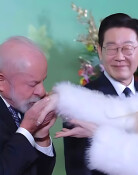Oriental Medicine Going Global
Oriental Medicine Going Global
Posted January. 27, 2006 03:06,

Oriental Medicine Going Global, a three-part documentary that will air January 28 and 29 on EBS will introduce the current oriental medicine globalization phenomenon sweeping the West.
The first part, Oriental Medicine: Leading the 21st Century Medical Revolution, that will air on January 28 at 7:20 p.m., will show the interest of Western countries in acupuncture.
According to the program, 75 American universities teach acupuncture at the moment. Recently, the number of students attending the Southern California University School of Oriental Medicine and Acupuncture has doubled. And acupuncture is becoming more popular as an anesthetic appendectomies or plastic surgery,
The American National Institute of Health granted $130 million for the study of alternative medicine like acupuncture, and one third of the American population has been treated with oriental medicine at least once.
Europe is also on the move. The European acupuncture association that has over 10,000 members is currently conducting lab tests for the treatment of muscle spasms, constipation, bladder inflammations, and other diseases that can be treated with acupuncture.
Part Two of the series, which will air on January 28 at 8:10 p.m., will illustrate cases of modernization and globalization in the field of Chinese medicine.
China standardized its drug manufacturing laws in 1986 and strictly manages the quality of herbs, limiting sales to 15 wholesalers. Since 1991, China has selected 300 high school honors graduates every year to study at seven-year Chinese medicine schools in Beijing and Shanghai. The students go through two years of general culture and language courses, and five years of both Western and Oriental medical training.
The last part of the series, which will air on January 29 at 8:10 p.m., will touch upon the potential of Korean Oriental medicine. Domestic medical communities are developing acupuncture and herbs to cure obesity, nearsightedness, alcohol addiction, stress, apoplexy, and other diseases.
The recent bee sting report in the world-renowned scientific journal Brain Research by professor Lee Jang-hyeon at Seoul National University is a promising harbinger of the endless potential of Korean medicine.
Jung-Bo Suh suhchoi@donga.com







